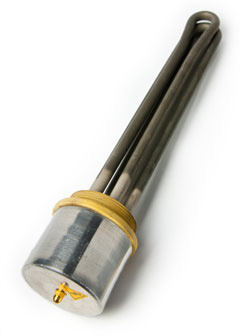HEATERS TO WATER IMMERSION
APPLICATION
The field of use of such water for immersion heaters is very large and spread across all industry sectors. They are used wherever it is necessary to raise the temperature of a low density fluid using electrical energy. The most common uses are: water heating, solvent, salts and are characterized by a high specific power. The standard construction is AISI 321, but can also be produced in 316L if you have a need for food use, or Incoloy 800 in the case where the element will be put in contact with particularly aggressive substances
HEATERS FOR IMMERSION IN OIL
APPLICATION
As for the immersion heaters for oil, it is of low density heaters of powers constructed as to be immersed in those at high viscosity substances such as mineral oil, bitumen or even wax. They are used mainly to prevent excessive solidification of the product or to make it malleable to machining. The very low-power density, ensures that the product to be heated does not burn in the immediate vicinity of the resistive element, thus keeping intact their physical characteristics
IMMERSION HEATERS STANDARD AND NON-STANDARD
The immersion heaters are made on stopper in a wide range of size and power from 0.3 kW STOPPER 1 “Ranked # 1 element Ø 8 to 20 Kw STOPPER 2” with 2.1 Ranked # 3 elements Ø 16 . On request we can build heaters with voltage, power and size different from standard types; compatibly with the constructive technical possibilities.
APPLICATIONS
- Water Heating
- Heating heat exchangers
- Heating mineral oil
- Food machines
QUALITY CHECK
All immersion heaters are subjected to the test of quality and safety. The tests are performed with automatic machine and comply with all applicable legislation.




